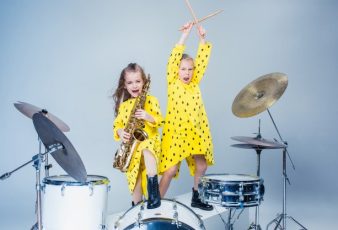Music has a power of forming the character and should therefore be introduced into the education of the young.
~Aristotle was sure that music creates and recreates character.
Teaching children to learn how to play a musical instrument is seen as an invaluable and life-enriching skill. It offers an opportunity for kids to explore and experience different cultures, emotions, and creativity. Aside from developing good focus and concentration, it also helps improve problem-solving skills and increases analytical thinking while teaching discipline and commitment. Research has shown that studying a musical instrument has many physical benefits, such as improving coordination and hand-eye coordination.
What are the developmental benefits of piano lessons for kids?
Music lessons are more than just an extracurricular activity–it is an opportunity for growing minds to explore their creative side, boost their intellectual capabilities, and create lasting memories.
Improved Counting & Math Skills

Music and math are surprisingly intertwined. This is evidenced by the fact that students who are involved in music classes and learn how to play piano, tend to excel in mathematics more than those who do not take music classes. It is likely because musical literacy requires a degree of deduction and logic since one must understand the relationship between notes and chords.
Structural similarities exist between the two subjects with elements like
- time signatures
- scales
- intervals
- sequence
These concepts play an important role in both math and music. Even if you have no formal training in either field, it is not hard to recognize that counting measures or sets of sound frequencies can lead to mathematical patterns. Undoubtedly, this interplay between these two disciplines can help students cross boundaries for better learning.
With Piano Lessons, Your Child will be Emotionally Balanced and More Social

Piano lessons help to build confidence in young students as they develop the ability to work hard on a goal over time. Learning piano is also beneficial in that it encourages children to interact with people outside of their immediate circle – be it a teacher or fellow classmates in group lessons – and understand interpersonal relationships.
Not to mention, playing music has been scientifically proven to stimulate physical responses that can relax us and even make us feel happier. With all these benefits, it’s safe to say that any parent would find value in enrolling their child in piano lessons.
Playing the Piano Improves Memory

Learning to play the piano helps to develop visual and auditory memory. Regular practice of playing an instrument can help create new pathways for information retention in the brain, making it easier for musicians to remember complex pieces of music.
People who are actively involved in learning an instrument experience enhanced cognitive skills like greater concentration and longer attention spans when schooling or studying. Learning how to play piano helps the mind focus on patterns and repetition encourages creative problem-solving which makes difficult musical pieces more manageable. All-in-all, playing piano can provide innovative ways of improving one’s memory power.
Children Perform Better in School

Many students may be surprised to learn that taking up a musical instrument can provide them with more than just musical expertise. Learning and playing an instrument can have a substantial effect on the way children develop and perform at school.
In addition to developing motor skills and hand-eye control, studies suggest that learning music at an early age increases mental organization and recall capabilities in children as well as improving their concentration and cognitive processing levels.
Ultimately, these newly acquired skills are often reflected in improved academic performance in other subjects such as reading, math, and science. So while learning to play an instrument may seem like just an extra-curricular activities for children, it could have untold benefits that last far into their adult lives.
Playing the piano helps kids become a better problem-solver and collaborators

Playing the piano can help children develop essential skills such as:
- communication
- listening
- negotiation
- teamwork
These qualities are fundamental for meaningful cooperation. As kids learn to play an instrument together, the ability to share audio cues, remain in rhythm and respect their individual roles are all necessary components of achieving collaborative success.
Piano playing also helps kids refine their problem-solving strategies due to the complexities involved with mastering a musical language. Learning progressions as well as figuring out musical formulas while they practice together works wonders when it comes to mental development too -allowing children to become more observant, logical, and creative when communicating with each other making them better equipped to solve any predicament that might come up in their group endeavors.
Final thoughts
Engaging your children in music at an early age is a great way to help them form their character, reduce stress levels, and develop a sense of collaboration. While some may be tempted to pick the instrument for their kid or steer them towards one genre of music only, it’s important to challenge and encourage them to express themselves musically by exploring different instruments and styles.
With accessibility made easier through online lessons and apps, practicing music has become fun as well. By giving your children the freedom to experiment with different instruments and learning from instructors of their choice, you can foster their love for music in a meaningful way while helping them cultivate essential qualities they can use throughout life.
Additional:





























All Comments
gralion torile
hi!,I love your writing so so much! percentage we keep in touch more approximately your post on AOL? I need a specialist in this area to resolve my problem. May be that's you! Having a look forward to look you.